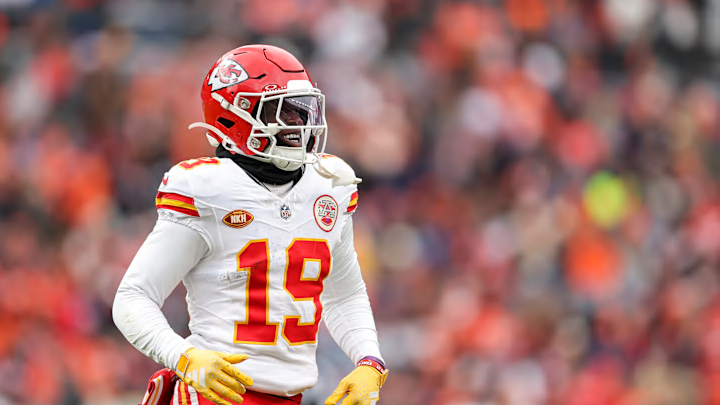Let's be clear up front: In many ways, this comparison is like apples and oranges.
From franchise needs to player value, from organizational culture to contract length, from position played to player intangibles, there's so much to assess when it comes to trading for any single player. So to say trading for Kadarius Toney in 2022 can somehow be equally compared or contrasted with the trade that sent Chase Young to the 49ers on Tuesday is wrong. They are totally different deals.
Let's discuss them anyway.
All of this is interesting, at least to me as an NFL writer and Chiefs fan, for the ways in which some deals go down and others do not. When the Arizona Cardinals only gave up a third-round pick for Rodney Hudson to anchor their o-line, it felt like a steal. San Francisco got Charles Omenihu for a 6th round choice from the Texans that turned into a year-and-a-half of a quality pass rusher. Then there's the DeAndre Hopkins deal in which the Cards fleeced the Texans for David Johnson, a second-round pick, and a swap of fourth-rounders. (Wait, somehow the Cards could still never get over the top but that's another story.)
Basically, trades are fascinating inasmuch as they reveal what matters to a team. How much is a team willing to go in when in the midst of competition? How do they value their own draft assets? What positions mean the most to them? It's all relative to the personalities in the front office at any particular time (or the mercurial ownership behind it all).
On Tuesday, the San Francisco 49ers dealt a third-round pick to the Washington Commanders for pass rusher Chase Young. While there was a flurry of deals submitted before the league's trade deadline, this was the biggest of them all for the name recognition (and production) of Young. After watching Montez Sweat being traded for a second-round pick (Chicago Bears), it felt unfair to see Young go for a round "cheaper".
Again, all deals are subjective and difficult to compare, but Young is a former ROY winner who is No. 8 in the NFL in pressures this year and he's still only 24 years old. What's amazing is that the Niners can either sign him long term and play him with Nick Bosa atop the NFC for years to come, OR they can let him walk in free agency and get a compensatory third-round pick right back—almost as if it never cost them anything to bolster the roster in the first place.
Oh yeah, Young is on his rookie deal so the finances involved are negligible.
If that sounds like a deal most teams should have taken, you're not alone to feel that way. What's even more interesting is to then look back a year earlier at the trade deadline to see who else was worth a third-round choice: wide receiver Kadarius Toney.
The Chiefs offered up a third-round pick (a compensatory one, by the way) along with a sixth-round choice to the New York Giants for Toney, a former first-round pick (top 20!) who the Giants couldn't get rid of fast enough. Looking back, it feels like the Chiefs were likely bargaining against themselves, but it also felt like a good buy at the time with the Tyreek Hill-sized hole in the offensive game plan. (Not that the Chiefs weren't scoring, but they definitely lacked someone with the dynamism to potentially score on any given play.)
Back to the comparisons. Again we should say it's unfair. Toney came with 2.5 years of team control, while Young has just 8-9 games. They play disparate positions on opposite sides of the ball. The Niners have their priorities and the Chiefs have theirs. It's unfair to just set these things side by side and make assumptions.
That said, everyone goes shopping in the NFL with the same basic credit card loaded with seven new rounds of draft picks each year and the same salary cap applying to every team. In that way, you can compare what teams decide to do with their picks.
The Chiefs knew Toney had injury concerns and/or personality issues (with the Giants) and that he'd never put it all together on the field in a way that made him a reliable contributor week after week. One year later, Toney has gone from being hailed as the No. 1 WR on the team to earning 19 catches for 109 yards for the entire half-season so far.
Then again, Toney's dynamism is still there and perhaps something will be unlocked with him yet. He's still very young with the potential to alter games, and the Chiefs do have a Super Bowl championship in part thanks to Toney's own important contributions on special teams and offense. How do you measure a trade like this? It's all intriguing.
What does seem eye-opening, at least to me, on a day like this NFL trade deadline day is that 31 other teams allowed the 49ers to import one of the top pass rushers in the league for a pick in the very round they'll get back if they just let him next March. Some deals make you shake your head when they're made as you wonder why your favorite team didn't agree to those terms. It's even more interesting when you see what they were willing to spend the same amount on just a year earlier.
